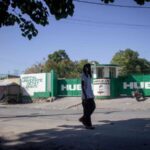By Nadine Dorelus
The issue of violence and sexual assault affects both sexes in the world as well as in Haiti. However, due to the reality of women facing social stereotypes, this article is particularly interested in the situation of girls and women in Haiti.
Since the surge of insecurity in Haiti with the quasi-territorial deployment of armed gangs in large metropolitan cities, girls and women have been the preferred targets of armed groups who reign supreme in the neighborhoods. In a report published jointly in October 2022 between the United Nations Integrated Office in Haiti and the Office of the United Nations High Commissioner for Human Rights (OHCHR), entitled “Sexual violence in Port-au-Prince: a weapon used by gangs to spread fear”, on the situation of armed violence in Haiti, children as young as 10 years old and elderly women are systematically raped, often collectively in front of their parents and families.
Indeed, this criminal practice of armed gangs refers, without any form of exaggeration, to a socio-cultural reality that has a hard time in Haiti because violence and sexual assault against girls and women in particular are endemic to Haitian society, in particular. because of the culture of machismo, phallocracy and the trivialization of sexual assault in gender relations. According to the international NGO Médecins Sans Frontières (MSF) in Haiti, cited in a report by the Organization of American States (OAS) in 2018, entitled “Against their will: sexual and gender-based violence (SGBV) against young people in Haiti, »28% of women aged between 15 and 49 have been victims of sexual gender-based violence at some point in their lives. Most of the time, victims are not even aware that they have suffered rape or any other form of sexual abuse; or if they are, choose to hide in silence. This state of affairs is often due to lack of access to education and available resources, stigma, fear of reprisals from the aggressor or aggressors who may be people from the neighborhood or members family (parents, spouses, etc.) or heads of institutions, etc.
This reality represents a shortfall for respect for human rights in Haiti, particularly women’s rights, and above all a certain form of impunity enjoyed by sexual predators of all stripes in Haitian society. In this context, the victims continue to silently suffer in their flesh and soul the physical and moral pain and suffering from their husbands, their partners or any individual who often exercises hierarchical and psychological influence over of their victims. A woman in the eyes of most males in Haitian society is an ass and a pair of breasts, she is sexual prey. At school, at work, in public environments, the female body comes before the professional skills, cognitive abilities and personality of the woman.
This sociocultural perception and reality that we have of women in Haiti ended up leading to a strong problem of self-esteem, even self-rejection. As a matter of fact, young girls often resort to cosmetic surgery to rebuild their bodies, sometimes under conditions of high risk of irrecoverable health complications. We give ourselves new buttocks, we get our breasts straightened, we change the color of our skin. Because, the more slender and graceful you have a body, the more luck favors you in Haitian society, that is to say getting a job, receiving a promotion at work, being accepted into an institution, finding the gentleman who will take care of all his little needs. etc. Moreover, from their early childhood, in the family, girls are made to know that their gender is their passport. As a result, they try to be nice, to be attractive, instead of impressing with their eloquence and culture.
The paradox in Haitian society is that if one day a woman cries about harassment, rape in Haiti, if the person indexed is a personality past presentation, that is to say having pillaged on the street in society , there is a strong chance that it is the woman who is being attacked, taken to be a bad person (yon bouzen) wanting to tarnish the image of a good person. At the level of Justice, it is not surprising to hear a judge ask and declare to a woman who is the victim of domestic violence or sexual assault by her husband or partner who comes to file a complaint against the latter: What did you do to him (Kisa ke w te fe l?). This shows that the Haitian boy has the natural right to hit, rape his wife or his partner as long as she does not conform to his whims.
Many public figures in Haiti have had their names splashed in rape or sexual assault scandals without yet finding themselves before the courts to answer for their actions. Suffice it to say that sexual violence and assault are not perceived as criminal behavior despite the laws condemning these acts. As we had previously insinuated, in the same way that sexual gender-based violence (SGBV) is committed by armed gang members, seen and known, it is also committed by individuals who are not likely to be indexed. because of their social, professional status or family lines (parents, spouses, uncles, cousins, etc.).
These male individuals who often deceive with their social and professional status, displaying the face of good people or acclaimed as such, happily enjoy a form of impunity, unfortunately aided by the disbelief of potential victims, but above all by culture. machismo, stigmatization and trivialization of sexual assault in Haitian society. This situation represents a real form of insecurity for the entire social body as is the case with social insecurity today implemented by armed gangs in Haiti.
What about Haitian law regarding sexual violence and assault?
Haitian criminal law punishes sexual assault in the Haitian penal code in articles 278, 279 and 280. Articles 278 and 280 read respectively as follows:
Art 278 “Anyone who commits the crime of rape, or is guilty of any other sexual assault, committed or attempted with violence, threats, surprise or psychological pressure against a person of either sex, will be punished with ten years of labor. strengths.
Any person who commits a public outrage against modesty will be punished by imprisonment of three months to one year, and a fine of sixteen gourdes to forty-eight gourdes.
Art 280: “The penalty will be that of forced labor for life, if the culprits are from the class of those who have authority over the person against whom they committed the attack or who abuse the authority conferred on them by their functions, or if the guilty person, whoever they may be, was aided in their crime by one or more people, or if death ensued. »
These articles transcribed here remain one of the legal references in matters of criminal prosecution in Haiti against people guilty of violence and sexual assault against women. However, most of the time victims remain silent because they do not have clear material evidence to convince the courts of the reality of an attempted or completed sexual assault. This is why it is up to the prosecuting authorities (Art 13 of the Code of Criminal Investigation-CIC-) to deepen their inquiries and investigations in order to prevent sexual predators from continuing to enjoy impunity because the moral and psychological damage that a person suffers following a sexual assault are intractable when the victim is unable to find justice, either because they do not have material evidence or because there is a lack of commitment on the part of State institutions to guarantee Justice, as is the case today with the weakening of State authority due to the non-existence of public institutions in Haiti.
Nowadays, the culture of silence is required as a model of collective behavior in Haitian society in the face of those who commit acts detrimental to the rights and freedoms of people, to the dignity and physical and moral integrity of people in terms of of sexual assault. This model of behavior is far from being a guarantee of protection and security for victims and potential victims of violence and sexual assault. Because, the more there is impunity, the more the executioners, aggressors and sexual predators feel they are in conquered territory, and then give themselves all the rights and powers at the expense of their victims who become more vulnerable, as evidenced by the reality of insecurity in Haiti today.
Finally, it should be remembered that Justice remains the only guarantor of the rule of law in a society. Justice elevates a Nation, says a saying. Conversely, this amounts to saying that impunity is a poison that slowly kills a society, which is what we are witnessing today in Haiti. The English philosopher Thomas Hobbes emphasizes in his writings (Leviathan) that man is a predatory being by his animal nature, buried within him. A criminal, a sexual predator has neither face nor social status. He could be anyone. There is no functioning society in the world because people are good. It is the force of laws, that is to say the authority of the State which disciplines behavior, corrects abuses and guarantees Security, Protection and Peace to all members of the social body. As such, I suggest that it be considered in the context of the situation of women in Haiti, the need to strengthen the laws and institutions in Haiti in terms of women’s rights and at the same time to demystify divorce procedures, and in alimony and child custody, for simple and easy access for women to go to justice when they are victims of acts that violate their rights and their dignity as a person.
Nadine Dorelus
Lawyer, gender specialist



